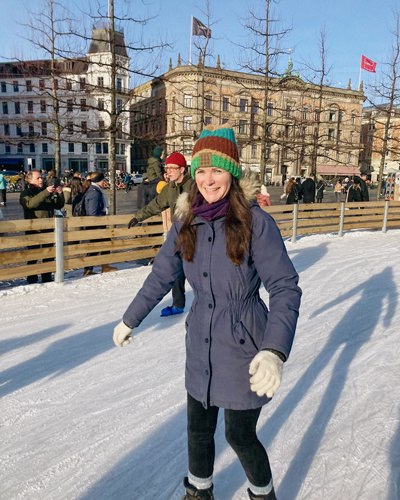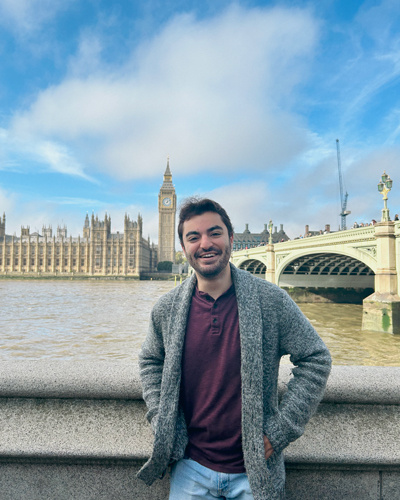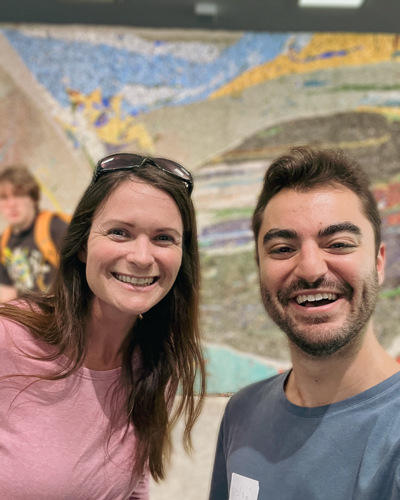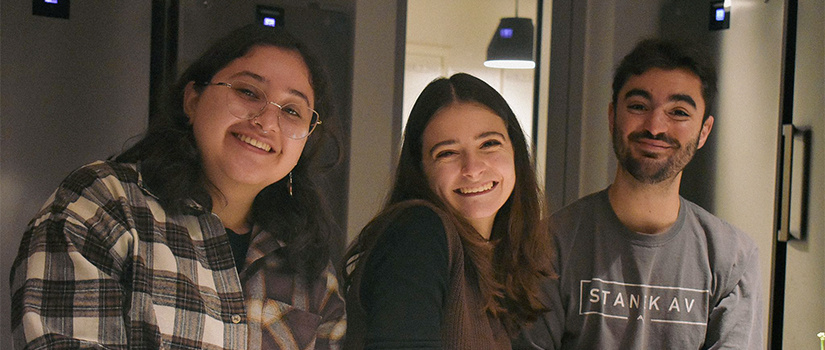Kate Barnwell and Carlos Sanchez Julia have a lot in common. Some similarities are more commonplace: They both grew up in South Carolina and graduated from the University of South Carolina in spring 2024. Others, however, are a bit more niche.
Both earned the Benjamin A. Gilman International Scholarship for study abroad as undergraduates, with Barnwell studying in Edinburgh, Scotland, and Sanchez Julia in Sao Paulo, Brazil. Both are interested in the environment, though in slightly different ways — Barnwell focuses on agricultural techniques, while Sanchez Julia explores environmental policies. And both received the Erasmus Mundus Joint Masters scholarship, which supports two years of graduate education in at least two European countries. Graduates earn two or more master’s degrees.
Though they did not choose the same master’s program, you might still be able to guess where their story is heading: They’re both spending their first year of study in the same city –– Copenhagen, Denmark.
The EMJM program offers interdisciplinary master’s degrees, bringing together cohorts of students from around the world. Though Barnwell and Sanchez Julia are just beginning these exciting programs, their passions for the environment are deeply rooted.

Meet Kate Barnwell
Before beginning a bachelor’s degree in geography at USC in 2020, Barnwell had a decade-long career in agriculture, owning and operating organic farms in the Upstate. Her current farm, Goldhorse in Spartanburg, is in her mother’s capable hands while Barnwell earns her master’s degrees abroad. Prior to the Erasmus Mundus program, Barnwell had been experimenting with a technique called agroforestry.
“In agroforestry, we're trying to intercrop soybeans with chestnuts, for example,” she explains. “So you're trying to get two crops in one, and usually there’s an understory and an overstory, and you’re getting two kinds of different crops...maybe the farmer can get a more high value crop with chestnuts, for example, but also get a thing that they know they're going to be able to sell like corn or soybeans. It's just the combination of two different goals in farming or forestry.”
This interest — which only grew following an internship with the South Carolina Forestry Commission — inspired her to apply for the EMJM Sustainable Forest and Nature Management (SUFONAMA) program. Barnwell attests that the program, which builds on her interest in agroforestry, is the perfect fit for her learning style.
“My first (course) block I was doing a mandatory ecology class, and it was amazing because we went on so many excursions,” she says. “Half the time, we were in a bus on our way to look at forests in the Netherlands or Germany or around Denmark. They really got us out of the classroom quite a bit and did a lot of hands-on outdoor learning, which I absolutely love. I learn so much better outside than in the classroom.”
Barnwell won’t just have the opportunity to learn outside of the classroom — she’ll also have the chance to learn beyond borders. Following her coursework in Denmark, Barnwell will move Italy and begin the second part of her studies at the University of Padua. For Barnwell, who is eager to begin her thesis research on agroforestry techniques in mountainous terrain, Padua is an ideal location.
“I'm really looking forward to the year in Padua because the concentration is mountain forestry," she says. “I have a few classes there that deal with river restoration and hydrology, which also interest me, and it's kind of a very different subject than I'm studying right now.”

Meet Carlos Sanchez Julia
Sanchez Julia hadn’t always planned on pursuing a master’s degree immediately following undergrad, but his Honors senior thesis changed his mind. The project, which earned him the William A. Mould Honors Senior Thesis Award in 2024, focused on cacao production on an ecological reserve in Ecuador. The more Sanchez Julia learned about the complicated relationship between the environment, economics and community, the more he realized that his academic journey was far from complete.
“All of a sudden, there was this hunger for knowledge that I hadn't had before,” Sanchez Julia reflects. “I was like, ‘I need to go and learn more about this.’ After my thesis especially, I came away from that experience with more questions than answers. I was like, ‘I owe it to myself to work on finding these answers, and I'm not going to be satisfied until I do.’”
He chose the EMJM MERGED Global Environment and Development program to continue investigating the impact that economic policies have on environmental initiatives, as well as the ways in which conservation efforts affect global decision-making.
Throughout his first classes, Sanchez Julia appreciated his cohort’s international perspectives, which added complexity and nuance to the coursework. His classmates come from all continents except for Antarctica and represent both the natural and social sciences.
“It’s been very interesting to see how people’s perspectives are different on the same issues, or at least the way that we approach these global environmental issues,” he says. “Whereas some people might say, ‘Oh, we need some biotech solution,’ others might look at it and say, ‘Oh, we need some U.N. resolution.’”
Sanchez Julia will continue to diversify his academic experiences throughout the program. In February, he and his cohort will travel to Malaysia for field research on the island of Borneo. They plan to partner with students from the University of Malaysia and work with local communities to investigate environmental issues such as deforestation and livelihoods.
Later in the program, Sanchez Julia will study at the University of Warsaw in Warsaw, Poland, and he’s eager for the opportunity to learn Polish and develop a topic for his thesis project.
“Pretty much every class, when (we) talk about something, I’m like, ‘Oh my gosh, I could do this for a thesis.’ And then the next class, we talk about something related to it that completely shoots that idea down or at least alters the way of thinking about it,” Sanchez Julia explains.
Finding their niche
Outside of the classroom, Barnwell and Sanchez Julia have been exploring Copenhagen and immersing themselves in the city's culture. Though Denmark's winter is brisk, and daylight hours are short, previous study abroad experiences taught Barnwell and Sanchez Julia how to deal with different climates.
“I think (studying abroad) is actually a benefit because you learn some things, like you need to take vitamin D and celebrate and have fun with friends to make you feel a little bit better when it's getting dark at 4 o’clock,” says Barnwell.

One day in December, they did just that, meeting up for some ice skating in Copenhagen. Though there have been a few adjustments to living and learning abroad, Barnwell and Sanchez Julia appreciate the challenges, as well as the communities they’ve fostered. “The experience of getting to be around people of all different nationalities is just so cool,” says Barnwell. “We have a lot of people in our program that are in their 30s like me, so they've had a career before this career path that they bring, and they bring that experience also.”
“All Erasmus Mundus degrees are pretty niche, I would say. It’s attracting people that are your kind of people in one way or another,” says Sanchez Julia. “If there’s a niche that people have, I think this is a great way to explore it and take some time to learn more about it.”
